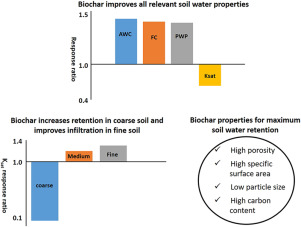当前位置:
X-MOL 学术
›
Sci. Total Environ.
›
论文详情
Our official English website, www.x-mol.net, welcomes your feedback! (Note: you will need to create a separate account there.)
A meta-analysis on biochar's effects on soil water properties - New insights and future research challenges.
Science of the Total Environment ( IF 9.8 ) Pub Date : 2020-01-22 , DOI: 10.1016/j.scitotenv.2020.136857 Ifeoma G Edeh 1 , Ondřej Mašek 1 , Wolfram Buss 2
Science of the Total Environment ( IF 9.8 ) Pub Date : 2020-01-22 , DOI: 10.1016/j.scitotenv.2020.136857 Ifeoma G Edeh 1 , Ondřej Mašek 1 , Wolfram Buss 2
Affiliation

|
Biochar can significantly alter water relations in soil and therefore, can play an important part in increasing the resilience of agricultural systems to drought conditions. To enable matching of biochar to soil constraints and application needs, a thorough understanding of the impact of biochar properties on relevant soil parameters is necessary. This meta-analysis of the available literature for the first time quantitatively assess the effect of not just biochar application, but different biochar properties on the full sets of key soil hydraulic parameters, i.e., the available water content (AWC), saturated hydraulic conductivity (Ksat), field capacity (FC), permanent wilting point (PWP) and total porosity (TP). The review shows that biochar increased soil water retention and decreased Ksat in sandy soils and increased Ksat and hence decreased runoff in clayey soils. On average, regardless of soil type, biochar application increased AWC (28.5%), FC (20.4%), PWP (16.7%) and TP (9.1%), while it reduced Ksat (38.7%) and BD (0.8%). Biochar was most effective in improving soil water properties in coarse-textured soils with application rates between 30 and 70 t/ha. The key factors influencing biochar performance were particle size, specific surface area and porosity indicating that both soil-biochar inter-particle and biochar intra-particle pores are important factors. To achieve optimum water relations in sandy soils (>60% sand and <20% clay), biochar with a small particle size (<2 mm) and high specific surface area and porosity should be applied. In clayey soil (>50% clay), <30 t/ha of a high surface area biochar is ideal.
中文翻译:

关于生物炭对土壤水分特性影响的荟萃分析-新见解和未来研究挑战。
生物炭可以显着改变土壤中的水分关系,因此,在提高农业系统对干旱条件的适应性方面可以发挥重要作用。为了使生物炭与土壤限制条件和应用需求相匹配,必须全面了解生物炭特性对相关土壤参数的影响。这项对现有文献的荟萃分析首次定量评估了不仅施用生物炭,而且不同生物炭特性对整套关键土壤水力参数(即有效水含量(AWC),饱和水力传导率( Ksat),田间持水量(FC),永久萎point点(PWP)和总孔隙率(TP)。该评价表明,生物炭增加了土壤水分的持水量,降低了沙质土壤中的Ksat,增加了Ksat,从而减少了黏性土壤中的径流。平均而言,无论土壤类型如何,生物炭施用量均增加了AWC(28.5%),FC(20.4%),PWP(16.7%)和TP(9.1%),同时减少了Ksat(38.7%)和BD(0.8%)。生物炭在施用量为30吨/公顷至70吨/公顷之间的情况下,对于改善粗纹理土壤的土壤水分特性最为有效。影响生物炭性能的关键因素是粒径,比表面积和孔隙率,这表明土壤-生物炭颗粒间和生物炭颗粒内的孔都是重要的因素。为了在沙质土壤(> 60%的沙子和<20%的粘土)中获得最佳的水分关系,应使用粒径(<2 mm)小,比表面积和孔隙率高的生物炭。
更新日期:2020-01-22
中文翻译:

关于生物炭对土壤水分特性影响的荟萃分析-新见解和未来研究挑战。
生物炭可以显着改变土壤中的水分关系,因此,在提高农业系统对干旱条件的适应性方面可以发挥重要作用。为了使生物炭与土壤限制条件和应用需求相匹配,必须全面了解生物炭特性对相关土壤参数的影响。这项对现有文献的荟萃分析首次定量评估了不仅施用生物炭,而且不同生物炭特性对整套关键土壤水力参数(即有效水含量(AWC),饱和水力传导率( Ksat),田间持水量(FC),永久萎point点(PWP)和总孔隙率(TP)。该评价表明,生物炭增加了土壤水分的持水量,降低了沙质土壤中的Ksat,增加了Ksat,从而减少了黏性土壤中的径流。平均而言,无论土壤类型如何,生物炭施用量均增加了AWC(28.5%),FC(20.4%),PWP(16.7%)和TP(9.1%),同时减少了Ksat(38.7%)和BD(0.8%)。生物炭在施用量为30吨/公顷至70吨/公顷之间的情况下,对于改善粗纹理土壤的土壤水分特性最为有效。影响生物炭性能的关键因素是粒径,比表面积和孔隙率,这表明土壤-生物炭颗粒间和生物炭颗粒内的孔都是重要的因素。为了在沙质土壤(> 60%的沙子和<20%的粘土)中获得最佳的水分关系,应使用粒径(<2 mm)小,比表面积和孔隙率高的生物炭。

























 京公网安备 11010802027423号
京公网安备 11010802027423号